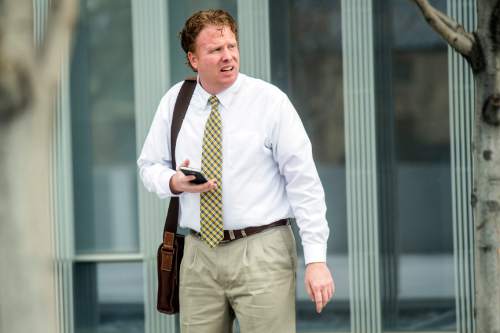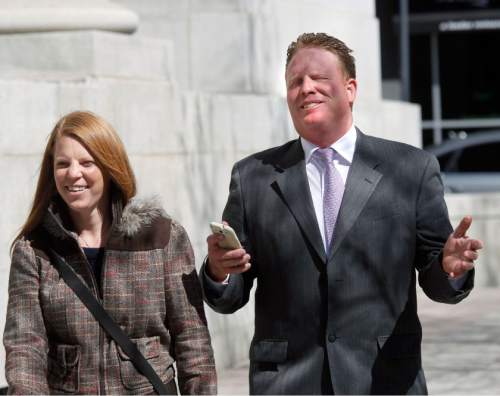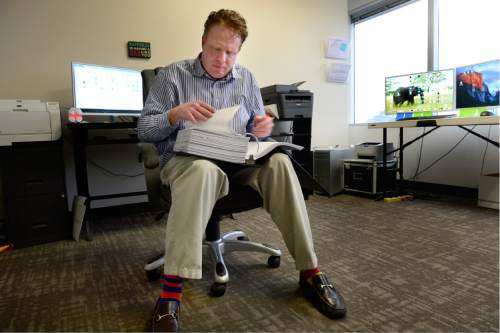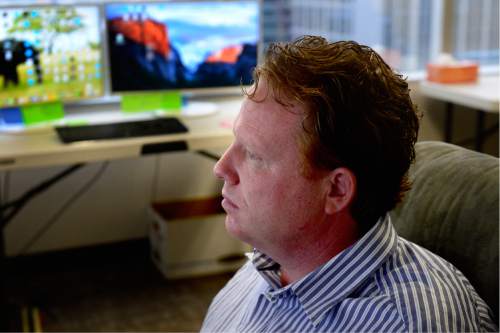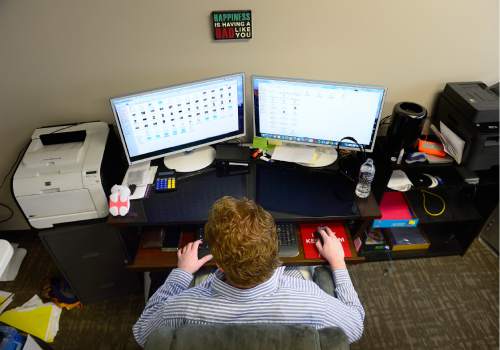This is an archived article that was published on sltrib.com in 2016, and information in the article may be outdated. It is provided only for personal research purposes and may not be reprinted.
If the federal government's criminal case against businessman Jeremy Johnson is all-out bank fraud, as a prosecutor told a jury Monday, then, Johnson and defense attorneys asked, in essence, "Where's the missing evidence?" "Where's the bank?
And, they demanded, "Show us the money."
The prosecutor opened the government's case Monday against the St. George businessman and two top employees of his online marketing operation by accusing them of creating a number of straw companies to fool banks into giving them new accounts after a large number of consumer chargebacks endangered their business.
But the trial got off to a start that signaled it could be a contentious affair during the four to six weeks it is expected to last when defense attorney Marcus Mumford was called to the bench by presiding U. S. District Judge David Nuffer to discuss remarks made at the beginning of his opening statement.
Johnson — who is a key figure in the criminal cases against former Utah Attorneys General Mark Shurtleff and John Swallow — and fellow defendants Scott Leavitt and Ryan Riddle face 86 charges related to their operation of Johnson's I Works that could land them years or even decades in prison if convicted.
Assistant U.S. Attorney Robert Lunnen, the lead prosecutor, told the 15-member jury — which includes three substitutes — that Johnson and other I Works staffers set up a series of companies using the names of employees, friends and family to trick banks into opening new accounts for them.
"This case is all about bank fraud," Lunnen said in his opening statement.
The alleged fraud was prompted in 2009, when I Works began to experience a high rate of consumers who demanded refunds on their credit cards, an action known as chargebacks, Lunnen said. That got I Works placed on a warning list, which, in turn, prompted banks to begin closing I Works accounts, meaning the company could not continue to charge consumers' cards through those accounts.
"You will hear that this caused the defendants to panic," Lunnen said.
Johnson, Leavitt, Riddle and others created "shell companies" in various states, used mail addresses at UPS outlets, obtained phones with area codes matching the addresses and then, on account applications, also listed the number of employees who supposedly worked at the entity.
I Works employees used the false information to open accounts at Wells Fargo Bank with which I Works could continue charging credit cards, Lunnen said.
And the government's first witness, Martin Elliott, global head of brand protection for credit card giant Visa USA, testified that I Works-related companies had unusually high numbers of chargebacks, a rate he said indicated fraud or a breakdown in the companies' operations. And he said those chargebacks prompted hundreds of thousands of dollars of fees assessed to the banks.
He also cited a "extremely negative impact" to the banks, Visa and credit-card holders.
That prompted Johnson, who is acting as his own attorney and who had been quiet most of the day, to tell Nuffer that some of the accounts mentioned by Elliott weren't even those of I Works, but that he would need access to an old company computer server to show that. Defendants have pressed the government and the court numerous times to get them a usable copy of the server called "Yellow" to replace the nonfunctioning one they were given, but U.S. Magistrate Judge Paul Warner and Nuffer have rebuffed those requests.
"The only way we have to prove that is the Yellow server," Johnson said after the jury had gone home for the day.
Since Elliott brought up the issue of monies that the bank might have lost, the defendants should be able to show that Wells Fargo Bank did not lose any money by processing payments for Johnson's companies, Johnson said. But that is also an issue that Nuffer has ruled could not be brought up at trial.
Mumford used his opening statement to attack the allegations that Wells Fargo Bank had been defrauded by Leavitt and the other two defendants.
Wells Fargo never signed any of the merchant account agreements with I Works, he said, and all the paperwork was taken care of by a California company called CardFlex.
"You will not find any of them signed by Wells Fargo," Mumford told the jury, "even though the document itself says it must in order to be in effect."
A defense expert will testify that he had never seen a merchant account application that was not signed by a bank, Mumford said.
Mumford recently filed a motion to dismiss the case in which he argued that a joint venture between Wells Fargo Bank and First Data Corp., called Wells Fargo Merchant Services, actually held the accounts and not Wells Fargo Bank, and that meant no bank fraud could have taken place. Nuffer struck down the motion before the trial began.
Mumford also pointed out that the applications for merchant accounts contained an I Works email address and that Johnson had personally guaranteed the accounts, meaning his participation was known to CardFlex.
In addition, CardFlex held millions of I Works dollars in a reserve account to pay for any losses, he said.
"There was no concealment," Mumford said. "Everyone knew."
Mumford got into trouble with Nuffer — after two objections by Lunnen — for making statements that went beyond the established rules.
"Mr. Mumford I told you," the judge said after the second objection. "Don't go for three."
Riddle, who also is acting as his own lawyer, said in his opening statement that I Works management didn't even know that Wells Fargo was involved in the merchant accounts.
"I worked with CardFlex and CardFlex only," Riddle said. CardFlex employees "knew exactly what was going on."


